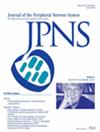Intravenous Immunoglobulin Elevates Regulatory T Cells in Guillain-Barré Syndrome: A Potential Biomarker of Therapeutic Response
Abstract
Background and Aims
Intravenous immunoglobulin (IVIg) is the primary treatment for Guillain-Barré syndrome (GBS), yet its immunological mechanisms underlying variable clinical outcomes remain unclear. This study investigated the immunomodulatory effect of IVIg on regulatory T cells (Tregs), cytokines, and their association with treatment response and clinical outcomes.
Methods
In this prospective case-controlled study, 57 GBS patients and 57 age- and sex-matched healthy controls (HCs) were investigated. CD4+CD25+FoxP3+ Treg percentages, cytokine production (IL-10, TNF-α, IFN-γ, and IL-12), and serum C3 levels were measured using flow cytometry, Luminex assay, and turbidimetric methods, respectively. Treatment response was defined as ≥ 1-point GBS-disability score improvement during evaluation.
Results
GBS patients exhibited lower CD4+CD25+FoxP3+ Tregs frequencies compared to HCs (p = 0.006), which were inversely associated with serum C3 levels (p = 0.003) during the acute phase. At 4 weeks post-onset, patients with normal C3 levels (90–180 mg/dL) exhibited higher Treg frequencies (p = 0.005) compared to acute GBS, whereas patients with persistently elevated C3 levels showed reduced Treg percentage (p = 0.009). Among I VIg-treated patients, Tregs significantly increased at 2 and 4 weeks post-treatment, alongside significantly higher IL-10 and lower TNF-α, IFN-γ, and IL-12 levels at 4 weeks. However, patients with supportive care showed no such changes in Tregs and cytokine levels. Furthermore, Tregs elevated significantly in patients responsive to IVIg at 2 and 4 weeks (p < 0.05), but not in non-responsive or supportive care patients.
Interpretation
IVIg treatment modulates immune dysregulation in GBS by expanding CD4+CD25+FoxP3+ Tregs and altering cytokines and serum C3 levels, which are associated with clinical improvement. These findings indicate Tregs as potential biomarkers for monitoring initial clinical response to IVIg in GBS.

 求助内容:
求助内容: 应助结果提醒方式:
应助结果提醒方式:


